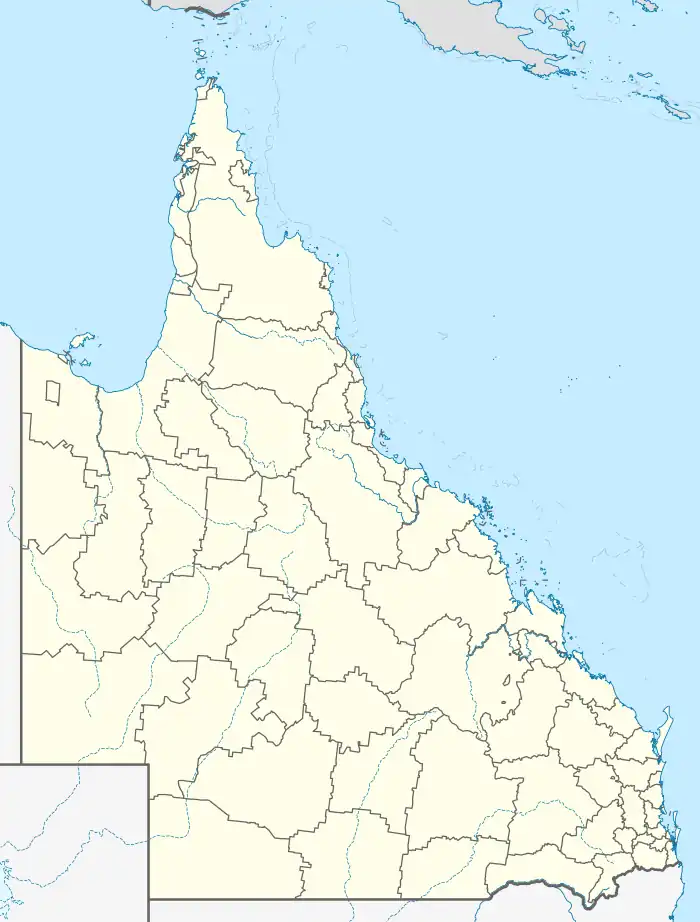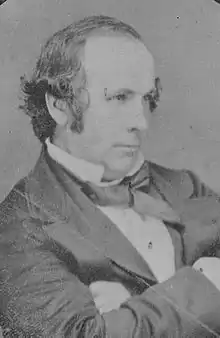| Innisfail Estate Queensland | |||||||||||||||
|---|---|---|---|---|---|---|---|---|---|---|---|---|---|---|---|
 Innisfail Estate | |||||||||||||||
| Coordinates | 17°31′02″S 146°02′40″E / 17.5172°S 146.0444°E | ||||||||||||||
| Population | 1,338 (2016 census)[1] | ||||||||||||||
| • Density | 335/km2 (866/sq mi) | ||||||||||||||
| Postcode(s) | 4860 | ||||||||||||||
| Area | 4.0 km2 (1.5 sq mi) | ||||||||||||||
| Time zone | AEST (UTC+10:00) | ||||||||||||||
| Location |
| ||||||||||||||
| LGA(s) | Cassowary Coast Region | ||||||||||||||
| State electorate(s) | Hill | ||||||||||||||
| Federal division(s) | Kennedy | ||||||||||||||
| |||||||||||||||
Innisfail Estate is a semi-rural locality in the Cassowary Coast Region, Queensland, Australia.[2] In the 2016 census, Innisfail Estate had a population of 1,338 people.[1]
Geography
Innisfail Estate is bounded by the Johnstone River to the east, south and west. It is flat low-lying land, below 10 metres (33 ft) above sea level. It is connected to Innisfail to the west across the river by the Geraldton Bridge (Geraldton being the former name of Innisfail).[3]
Rocky Point is at the south-east of the locality on the Johnstone River (17°31′00″S 146°03′00″E / 17.5166°S 146.05°E).[4]
The south-western part of the locality near the bridge is suburban. The east of the locality is undeveloped wetlands. The remainder of the locality is used for agriculture, predominantly growing sugarcane.[3]
History

In 1879 Thomas Henry Fitzgerald came to North Queensland looking for locations suitable to grow sugarcane. He was impressed by the potential of the Johnstone River district. Returning to Brisbane he established a company Fitzgerald & Co with the assistance of Roman Catholic Bishop of Brisbane James O'Quinn. On 23 April 1880 he returns to the area and establishes the first sugarcane plantation (called Innisfail Estate) with its own sugar mill. The mill closed in 1885 but by then there were a number of other mills in the Johnstone River district.[5]
By the 1940s there was a cane tramway through the Innisfail Estate, with a ferry connection for the tramway across the Johnstone River (approx 17°30′28″S 146°02′13″E / 17.5078°S 146.0370°E) to Innisfail and from there to the sugar mill.[6]
Innisfail State High School opened on 24 January 1955 and operated until the end of 2009 at 2 Stitt Street in Mighell.[7] In 2010, it was amalgamated with the Innisfail Inclusive Education Centre (a special education facility) and Tropical North Queensland TAFE (Innisfail Campus) to form Innisfail State College using the site of the TAFE campus at Innisfail Estate.[8][9][10]
In the 2016 census, Innisfail Estate had a population of 1,338 people.[1]
Education

Innisfail State College is a government primary and secondary (Early Childhood-12) school for boys and girls at 45 Flying Fish Point Road (17°30′57″S 146°02′13″E / 17.5159°S 146.0369°E).[11][12] In 2017, the school had an enrolment of 856 students with 85 teachers (81 full-time equivalent) and 57 non-teaching staff (43 full-time equivalent).[13] It includes an early childhood developmental program,[11] a diverse learning centre,[14] and a special education program.[15]
Although the college provides special education for primary school children, there is no mainstream primary school in Innisfail Estate. The nearest government primary school is Innisfail State School in Innisfail across the river to the west. Catholic primary and secondary schools are also in Innisfail.[3]
References
- 1 2 3 Australian Bureau of Statistics (27 June 2017). "Innisfail Estate (SSC)". 2016 Census QuickStats. Retrieved 20 October 2018.
- ↑ "Innisfail Estate – locality in Cassowary Coast Region (entry 45711)". Queensland Place Names. Queensland Government. Retrieved 18 September 2020.
- 1 2 3 "Queensland Globe". State of Queensland. Retrieved 1 October 2020.
- ↑ "Rocky Point – point in Cassowary Coast Regional (entry 28874)". Queensland Place Names. Queensland Government. Retrieved 18 September 2020.
- ↑ "SUGAR GROWING AT INNISFAIL". The Telegraph. Queensland, Australia. 25 April 1934. p. 13 (MEMORIAL ISSUE). Archived from the original on 1 October 2020. Retrieved 2 October 2020 – via National Library of Australia.
- ↑ "Innisfail" (Map). Queensland Government. 1943. Archived from the original on 1 October 2020. Retrieved 1 October 2020.
- ↑ "Local government meeting: Agenda" (PDF). Cassowary Coast Regional Council. 28 March 2013. pp. 176–180. Archived (PDF) from the original on 1 October 2020.
- ↑ "Opening and closing dates of Queensland Schools". Queensland Government. Retrieved 18 April 2019.
- ↑ "About us". Innisfail State College. 16 April 2020. Archived from the original on 1 October 2020. Retrieved 1 October 2020.
- ↑ "Queensland state school - centre closures" (PDF). Queensland Government. 20 August 2013. Archived (PDF) from the original on 20 March 2022. Retrieved 6 April 2022.
- 1 2 "State and non-state school details". Queensland Government. 9 July 2018. Archived from the original on 21 November 2018. Retrieved 21 November 2018.
- ↑ "Innisfail State College". Archived from the original on 23 March 2021. Retrieved 21 November 2018.
- ↑ "ACARA School Profile 2017". Archived from the original on 22 November 2018. Retrieved 22 November 2018.
- ↑ "Innisfail State College - Diverse Learning Centre". Archived from the original on 23 March 2021. Retrieved 21 November 2018.
- ↑ "Innisfail State College - Special Education Program". Archived from the original on 23 March 2021. Retrieved 21 November 2018.